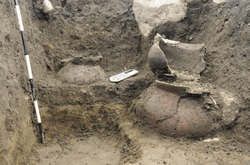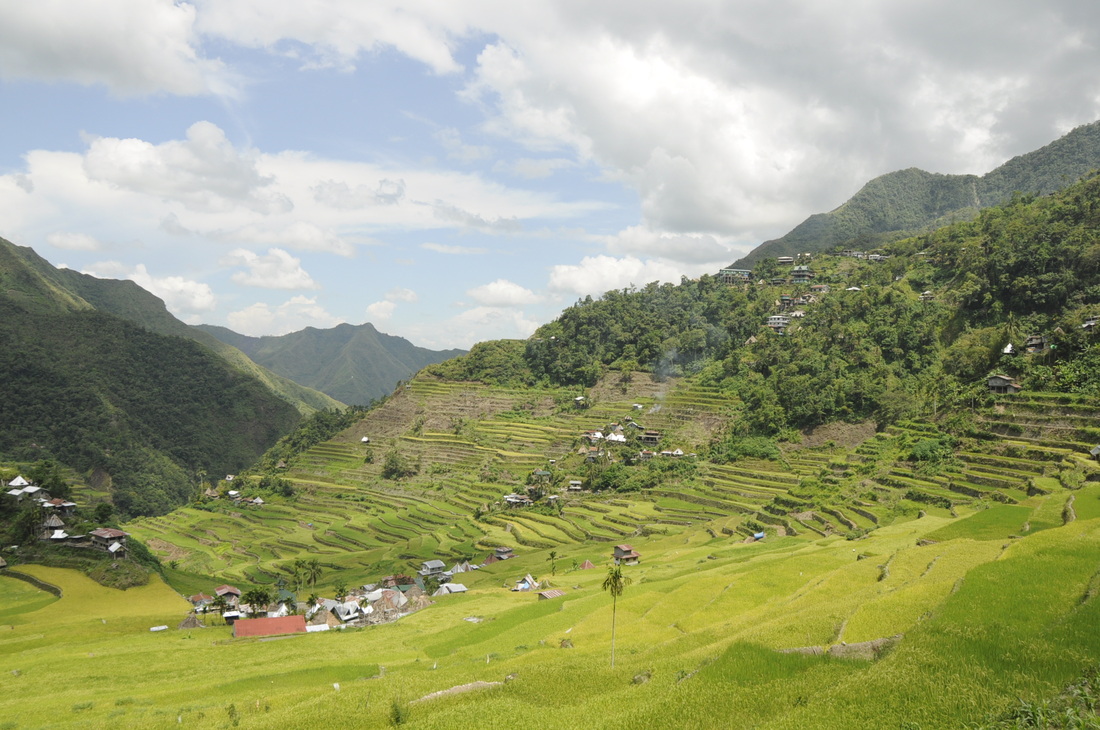
The Ifugao Archaeological Project is calling for applications to the 2015 Ifugao Archaeology Field School which runs from June 15-August 7, 2015 in Kiangan, Ifugao. Students participating in the field school will receive 12 quarter credits (equivalent to 8 semester credits – REU participants are responsible for tuition and fees)[1] while actively involved in the investigation of highland responses to Spanish colonialism. This project is sponsored by the Department of Anthropology at UCLA, in collaboration with the National Museum of the Philippines, Archaeological Studies Program-University of the Philippines, University of Washington, University of Wisconsin-Madison, Institute for Field Research, and the Save the Ifugao Terraces Movement, Inc. (SITMo).
Students participating in the 8-week field school will learn how to conduct archaeological field research; share the results of their studies by writing research papers and creating and participating in public presentations; and through active involvement in public outreach activities. The field season will be divided into blocks of activities, geared toward achieving the research goals of the project. Activities include participation in surface mapping, archaeological excavations, the initial processing of artifacts, ethnographic interviews, and laboratory analyses. Lectures, discussions, one-on-one meetings, and hands on laboratory training will be held every evening to guide students to complete their research projects.
This field school provides a venue for students to examine anthropological issues that include relationship between agricultural and irrigation systems, pathways to intensification, organizational entailments of irrigation systems and effects of colonialism on local political and economic activities. Such work informs us on the theoretical foundations of studies of agricultural systems and social organization by applying the model of self-organizing systems and provides an historico-ecological approach in the study of emergent complexity. More importantly, the Ifugao Archeological Project (IAP) has actively engaged the community, though the participation of the Save the Ifugao Terraces Movement, Inc. (SITMo) and descendant communities. Such continued engagement of stakeholders provides students with the opportunity to experience working side-by-side with community members.
The field school has been awarded funding by the National Science Foundation’s Research Experience for Undergraduates. Eight (8) undergraduate students (junior- and senior-standing) who are U.S. Citizens or permanent residents will be selected through a competitive process. Selected students will receive stipends that can be used for academic credit fees. Roundtrip airfare (LAX-MNL-LAX), field accommodation, meals, and ground travel will be covered by the project. Students are responsible for travel expenses to and from LA prior to the trip to the Philippines.
Research Background
The Ifugao Rice Terraces are UNESCO World Heritage monuments that attest to the ingenuity and communitarian management of Cordilleran people of Luzon in the Philippines. Once thought to be over 2,000 years old, our recent work has demonstrated that the upland rice field systems in the region were responses to the social and political pressure from intrusive Spanish colonization into the region starting at c. AD 1600. Shortly after the arrival of the Spanish in the northern Philippines, we see the emergence and rapid expansion of wet-rice cultivation in the highlands. The shallow time-depth of the origins of the highland agricultural terraces provides interesting questions for anthropologists, particularly on the impacts of colonialism to populations who did not have direct and/or intense interaction with the colonizing power. This research program aims to provide another dimension in the study of Spanish colonialism, as this is the first intensive research program that looks at Spanish colonialism in Asia. Our work contributes to anthropology and archaeology by investigating the economic and political options available to indigenous peoples impacted by powerful colonial forces. The project emphasizes the observation that indigenous minorities were not passive spectators during the colonization process.
To determine the impacts of Spanish colonialism on Philippine highland populations, the 2015 and 2016 field seasons of the Ifugao Archaeological Project (IAP) focuses on the Old Kiyyangan Village, an abandoned settlement in the town of Kiangan, Ifugao. The IAP’s primary research goals are: 1) to document highland political and economic responses to colonialism by looking at the development and expansion of the Old Kiyyangan Village; 2) to determine subsistence shifts and health and diet by examining botanical, faunal, and human skeletal remains; 3) to investigate the process of increasing social differentiation through the examination of exotic goods; and, 4) to understand how the Philippine highlands resisted Spanish colonialism by exploring settlement patterns in Ifugao.
[1] Academic credits are provided by Connecticut College. Academic credits are optional for REU participants, but are highly encouraged. Cost for the the academic credit is $1,550.00. For more information, click here.
To apply, CLICK HERE.
Application Deadline: March 15, 2015, 5pm PST
Students participating in the 8-week field school will learn how to conduct archaeological field research; share the results of their studies by writing research papers and creating and participating in public presentations; and through active involvement in public outreach activities. The field season will be divided into blocks of activities, geared toward achieving the research goals of the project. Activities include participation in surface mapping, archaeological excavations, the initial processing of artifacts, ethnographic interviews, and laboratory analyses. Lectures, discussions, one-on-one meetings, and hands on laboratory training will be held every evening to guide students to complete their research projects.
This field school provides a venue for students to examine anthropological issues that include relationship between agricultural and irrigation systems, pathways to intensification, organizational entailments of irrigation systems and effects of colonialism on local political and economic activities. Such work informs us on the theoretical foundations of studies of agricultural systems and social organization by applying the model of self-organizing systems and provides an historico-ecological approach in the study of emergent complexity. More importantly, the Ifugao Archeological Project (IAP) has actively engaged the community, though the participation of the Save the Ifugao Terraces Movement, Inc. (SITMo) and descendant communities. Such continued engagement of stakeholders provides students with the opportunity to experience working side-by-side with community members.
The field school has been awarded funding by the National Science Foundation’s Research Experience for Undergraduates. Eight (8) undergraduate students (junior- and senior-standing) who are U.S. Citizens or permanent residents will be selected through a competitive process. Selected students will receive stipends that can be used for academic credit fees. Roundtrip airfare (LAX-MNL-LAX), field accommodation, meals, and ground travel will be covered by the project. Students are responsible for travel expenses to and from LA prior to the trip to the Philippines.
Research Background
The Ifugao Rice Terraces are UNESCO World Heritage monuments that attest to the ingenuity and communitarian management of Cordilleran people of Luzon in the Philippines. Once thought to be over 2,000 years old, our recent work has demonstrated that the upland rice field systems in the region were responses to the social and political pressure from intrusive Spanish colonization into the region starting at c. AD 1600. Shortly after the arrival of the Spanish in the northern Philippines, we see the emergence and rapid expansion of wet-rice cultivation in the highlands. The shallow time-depth of the origins of the highland agricultural terraces provides interesting questions for anthropologists, particularly on the impacts of colonialism to populations who did not have direct and/or intense interaction with the colonizing power. This research program aims to provide another dimension in the study of Spanish colonialism, as this is the first intensive research program that looks at Spanish colonialism in Asia. Our work contributes to anthropology and archaeology by investigating the economic and political options available to indigenous peoples impacted by powerful colonial forces. The project emphasizes the observation that indigenous minorities were not passive spectators during the colonization process.
To determine the impacts of Spanish colonialism on Philippine highland populations, the 2015 and 2016 field seasons of the Ifugao Archaeological Project (IAP) focuses on the Old Kiyyangan Village, an abandoned settlement in the town of Kiangan, Ifugao. The IAP’s primary research goals are: 1) to document highland political and economic responses to colonialism by looking at the development and expansion of the Old Kiyyangan Village; 2) to determine subsistence shifts and health and diet by examining botanical, faunal, and human skeletal remains; 3) to investigate the process of increasing social differentiation through the examination of exotic goods; and, 4) to understand how the Philippine highlands resisted Spanish colonialism by exploring settlement patterns in Ifugao.
[1] Academic credits are provided by Connecticut College. Academic credits are optional for REU participants, but are highly encouraged. Cost for the the academic credit is $1,550.00. For more information, click here.
To apply, CLICK HERE.
Application Deadline: March 15, 2015, 5pm PST
